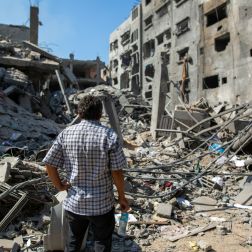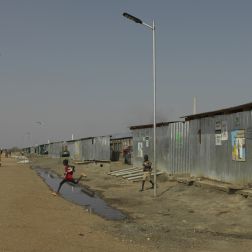- 3 mins read time
- Published: 19th June 2019
“It is not easy to live in isolation” – the women caught up in DRC’s Ebola crisis
Ebola has claimed more than 1,400 lives across the Democratic Republic of Congo (DRC) since August of last year. The most recent figures from the World Health Organisation show the total number of cases at almost 2,100, while the outbreak – the second largest in history – has also spread to neighbouring Uganda.
Oxfam was one of the first agencies to respond to the crisis in conflict-ridden DRC by providing clean, safe water and working with community leaders and volunteers to increase understanding of how to prevent the virus, and to dispel people’s myths and fears. So far, we’ve reached 138,000 people across the country.

Yvette* carries one of the children on her back. Photo: John Wessels/Oxfam. *Name changed
In Mangina, mother-of-seven Yvette* now cares for 10 children. Ebola claimed the life of her neighbour, so Yvette looks after the three orphaned children as well as her own family.
“She was only 35 and died at the beginning of the outbreak,” says Yvette. “Her children are like mine. The little girl fell sick after the death of her mother, her eyes are inflamed.”
For Yvette, the good news is that the children are on a vaccination list – they are currently waiting for a medical team to visit. In the meantime, she says that she feels isolated, adding: “The community is afraid of us.”
Elsewhere, mother-of-two Judith, who works as a primary school teacher, also found herself isolated as a result of Ebola.

Judith in her classroom. Photo: Alain Nking/Oxfam
Judith was quarantined for 21 days after the director of her school died of the virus. She says: “During my isolation, I felt like I was going to die at any moment. It is not easy to live in isolation and to always think that you may be carrying the dangerous and deadly disease that killed my director.”
Even when Judith eventually returned to work, she found a mostly empty classroom.
“Many parents became afraid after the death of the director,” she explains. “They think that their children could be infected by the virus in the school and especially in my contact. Many of them have not passed their final exams.”
Oxfam travelled to Judith’s school to give lessons on hygiene and install water points. Our staff also built an area where pupils and teachers who feel unwell could check their temperature and rest while waiting for transfer to a health centre.
“The Oxfam team came to my house to give me some food,” Judith adds. “The kit really helped my reintegration. When people saw Oxfam vehicles and agents coming to my house, the whole avenue came to see what was going on.
“When Oxfam left, the neighbours stayed at my house all night. It was the first time in a long time that I saw people in my home. It was a real joy for me.”
Ebola has already destroyed lives in DRC and Uganda – and millions more are at risk. Oxfam is working hard to prevent the spread of the virus by distributing clean, safe water and teaching communities about the importance of hygiene.
*Name changed to protect identity




